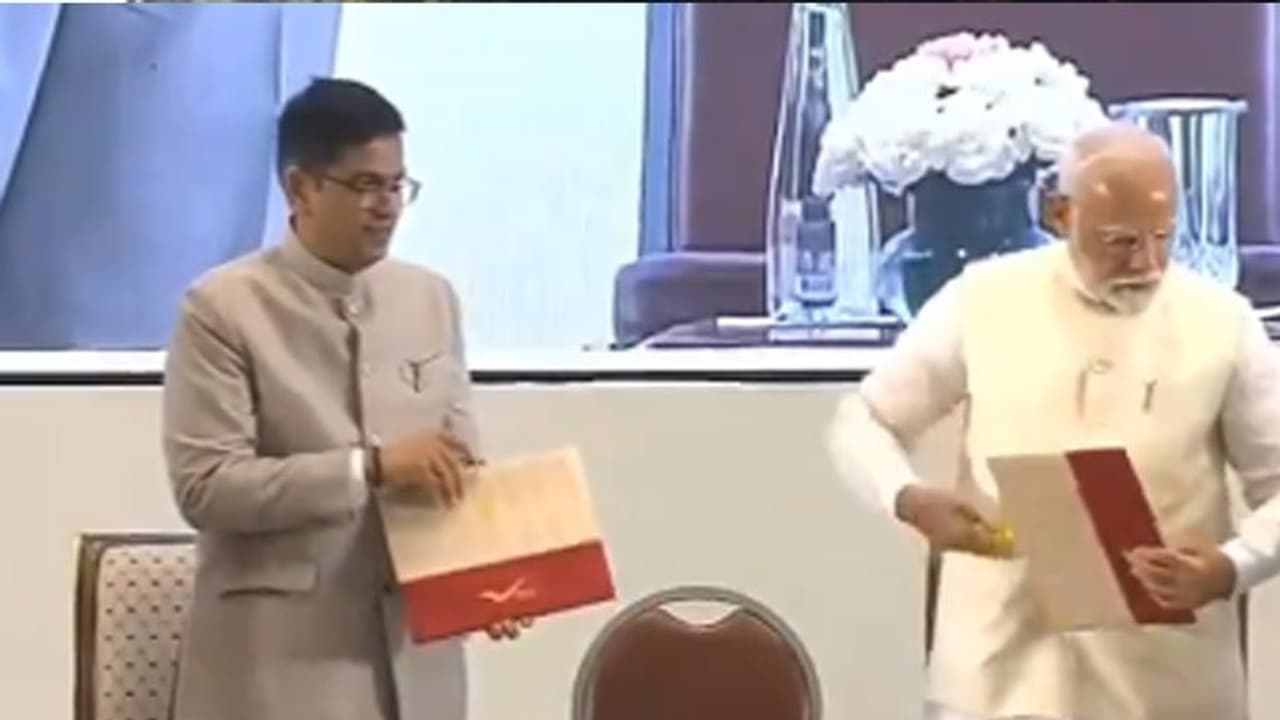While unveiling a special commemorative stamp and coin celebrating 75 years of the Supreme Court, PM Modi was seen placing the ribbon into his pocket, instead of discarding it or handing it to someone else.
In a moment that resonated with the principles of Swachh Bharat and set an example of responsible behaviour, Prime Minister Narendra Modi subtly won the hearts of many during the National Conference of District Judiciary at Bharat Mandapam in New Delhi.

While unveiling a special commemorative stamp and coin celebrating 75 years of the Supreme Court at the conference, the Prime Minister was seen placing the ribbon into his pocket, instead of discarding it or handing it to someone else—a gesture that quickly drew admiration on social media for its embodiment of cleanliness and responsibility.
PM Modi's gesture of pocketing the ribbon not only reinforced his personal commitment to the Swachh Bharat mission but also subtly highlighted the importance of individual responsibility in maintaining cleanliness.
"PM Modi leading by example. Notice how PM Modi didn't throw the Ribbon or give it to someone else. He put it in his Pocket. Swachh Bharat," wrote one user on X.
Another added, "PM Modi's gesture of putting the ribbon in his pocket instead of discarding it shows true leadership by example. Swachh Bharat isn't just a mission; it's a mindset! What small actions can you take to keep India clean?"
A third user noted, "That's why he is leader, unlike some fake self proclaimed over hyped leaders."
In his address, Prime Minister Modi lauded the Supreme Court’s role in upholding the trust and faith that Indians have placed in the judiciary over the past 75 years. “This is not just the journey of an institution; it is the journey of the Constitution of India and its constitutional values. It reflects India’s maturity as a democracy,” he remarked.
Modi emphasized that throughout India’s history, especially during challenging times such as the Emergency, the Supreme Court has played a crucial role in safeguarding fundamental rights and preserving national integrity. “The people of India have never distrusted the judiciary or the Supreme Court. The 75-year journey of the Supreme Court further enhances the glory of India as the Mother of Democracy. I can say with confidence that the SC has upheld the trust and faith we have in our institution,” the Prime Minister said.
Prime Minister Modi highlighted the government’s efforts over the last decade to eliminate delays in justice, pointing out that the country has spent approximately ₹8,000 crore on developing judicial infrastructure in the last 10 years. Notably, 75% of the amount spent on judicial infrastructure in the last 25 years has been allocated in the past decade.
Modi called the judiciary a “strong pillar” of the vision of a developed India in the ‘Amritkaal of Independence’. He also expressed deep concern over the safety of women and children, urging the judiciary to ensure swift justice in cases of atrocities against women. “Many strict laws have been made in the country for the safety of women, but we need to make them more effective. The faster decisions are taken in cases related to atrocities against women, the greater assurance of safety half the population will get,” he stated.
The two-day National Conference of District Judiciary, organized by the Supreme Court of India, was inaugurated with five working sessions planned to discuss critical issues related to the district judiciary. These sessions include topics such as infrastructure and human resources, inclusive courtrooms, judicial security and wellness, case management, and judicial training.
The session on “Infrastructure and Human Resources” aims to explore ways to enhance both the physical infrastructure and human capital available to the district judiciary, ensuring that it can function effectively and efficiently across the country.
The event saw the participation of Chief Justice of India D Y Chandrachud, other Judges of the Supreme Court, Union Minister of State (Independent Charge) for Law & Justice Arjun Ram Meghwal, Attorney General of India R Venkataramani, and President of the Supreme Court Bar Association Kapil Sibal. These esteemed figures, along with the Prime Minister, underscored the importance of the judiciary in India’s democratic framework and its role in shaping the future of the nation.
